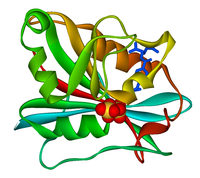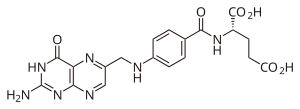 |
 |
Antifolates are a class of antimetabolite medications that antagonise (that is, block) the actions of folic acid (vitamin B9).[1] Folic acid's primary function in the body is as a cofactor to various methyltransferases involved in serine, methionine, thymidine and purine biosynthesis. Consequently, antifolates inhibit cell division, DNA/RNA synthesis and repair and protein synthesis. Some such as proguanil, pyrimethamine and trimethoprim selectively inhibit folate's actions in microbial organisms such as bacteria, protozoa and fungi. The majority of antifolates work by inhibiting dihydrofolate reductase (DHFR).[2]
- ^ "NCI: antifolate".
- ^ Ivan M. Kompis; Khalid Islam; Rudolf L. Then (2005). "DNA and RNA Synthesis: Antifolates". Chem. Rev. 105 (2): 593–620. doi:10.1021/cr0301144. PMID 15700958.